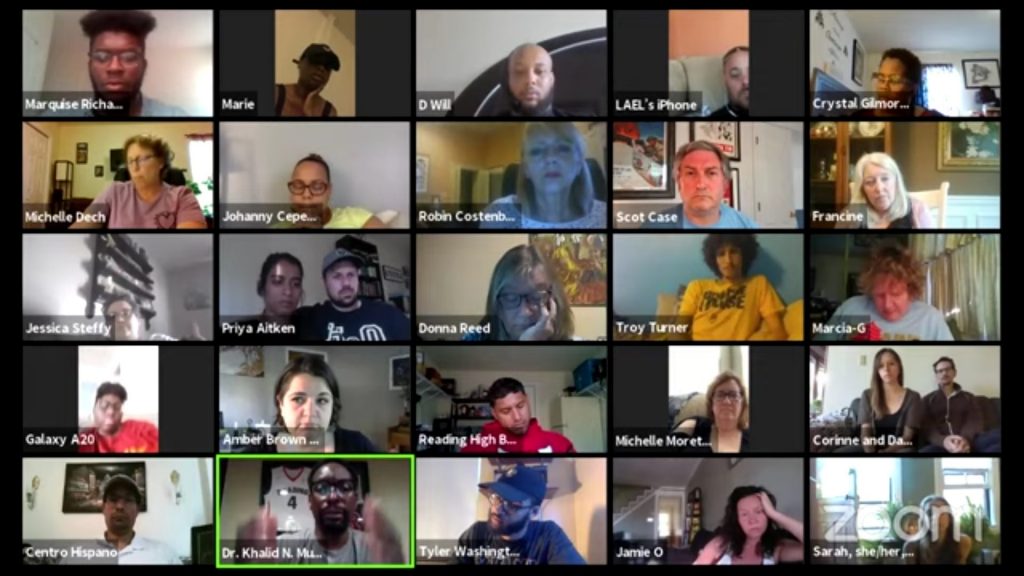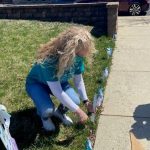Focusing on the experiences and healing of the Black community living in a Latino-majority city
 Screenshot of event livestream
Screenshot of event livestreamMore than 160 people listened in and participated in the Dear Reading town hall meeting Sunday night.
As protests and riots over police violence erupted across the nation, residents in and around Reading gathered online to speak about racism toward Black people in a city where Latinos are the majority.
The virtual State of Blackness town hall meeting, convened by the hosts of the Dear Reading podcast, became a nearly three-hour conversation. The wide-ranging discussion focused residents’ fears, how to advocate for themselves, how to hold “diverse” community leaders accountable and how to heal after tragedy.
Broadcast over video conference call Sunday night with more than 160 attendees joining via their homes, the feel of the event was informal. Community leaders, many of whom have previously appeared on the podcast, spoke candidly — and at times vulnerably — about race and the next steps in achieving equality.
Reading School District Superintendent Dr. Khalid N. Mumin decried the disparity between how law enforcement responds to white protesters and protests led by people of color.
“We had citizens, Pennsylvanians, at the state Capitol with AR-15s, and no one was shot and no one was arrested,” Mumin said, his voice intensifying. “And you get pulled over for having a fake $20 bill and you lose your life. The deck is stacked against all of us. And that hurts man.”
 Courtesy Dear Reading
Courtesy Dear ReadingDr. Khalid N. Mumin, superintendent of Reading School District, appeared on Dear Reading podcast in November of 2018.
Mumin implored attendees to look beyond protests, pushing them to get involved to make change.
“So, we need to take action,” Mumin said. “We show up at the state Capitol, without AR-15s, but with information; you push the system to change. That’s what we have to be about. Until we get to that point, this is all just interference and noise.”
Councilwoman Lucine Sihelnik called on people at the townhall to participate on the city’s youth committee and city initiatives committee, which she said are vacant. Nate Rivera, representing the Mayor Eddie Moran’s office, asked people to contact him to possibly sit on a city diversity board. Others suggested boycotts and supporting Black-owned businesses.
Councilwoman Johanny Cepeda-Freytiz said she actively chose not to join Sunday’s march, saying she is tired of marching and that more needs to be done. She also demanded that those in the conference call engage in their community beyond protest.
“I need everyone to rise up and stay risen,” Cepeda-Freytiz said. “Let’s not just march because this happened; this is going to continue to to happen and we need to start putting plans in effect. We have to stop talking, we have to start doing.”
Other than looking at how to affect change, the town hall was also a forum for people to express the everyday realities of anti-Black racism they’ve experienced in the Latino-majority city.
Disconnect between groups
The forum highlighted a disconnect between the Black community in Reading with the rest of the city. Though the city is a mix of races and nationalities, attendees said they have absolutely experienced anti-Black sentiments in the Latino community.
Dear Reading hosts Bri Tyson and Marie Sykes spoke about how they were openly mocked for their color, facial features and natural hair.
“We want our little brothers and sisters to be able to have that upbringing that we weren’t able to have, or have the feelings that their community loves them as much as they love their community,” said Reading native Bri Tyson. “Because it is something I’ve never felt growing up in Reading and to this day, I still don’t feel that way.”
Others also shared how they have felt out of place or unaccepted in Reading because of being Black.
Over the past 30 years, Reading has become a majority Latino city. Berks County’s most diverse municipality is currently nearly 67 percent Latino, 21 percent white and Black non-Latinos people make up little more than 12 percent of the population, according to 2019 census estimates.
The growing Latino community has achieved more representation in local government with the election of Moran, two Latina city council women and a Latino County Commissioner.
Just because elected officials are not white does not mean they are inherently mindful of the needs of Black community, Richards said. Especially when it comes to the statements they make, or don’t make, after an Black person is killed on tape.
 Courtesy Dear Reading
Courtesy Dear ReadingDear Reading podcasts hosts from left: DayQuan Williams, Bri Tyson, Marie Sykes and Marquise Richards. (Courtesy Dear Reading)
Keeping leaders accountable
In mid-May, Eddie Moran had to address police brutality after a Reading resident shared to Moran’s facebook Page a video showing multiple Reading police officers punching and tazing a Black man.
The city is investigating the use of force in the incident and the officers involved have not been publicly identified by city officials. One officer was reportedly placed on administrative leave because of the incident.
The town hall meeting also held elected officials’ feet to the fire when it came to crafting policy that directly affects Black people. Some guests also took issue with the types of messages leaders choose to share in regard to police killings of Black people.
Recent Black deaths across the nation and the lack of comments from local officials about those deaths were the catalyst for Sunday’s town hall, according to Dear Reading host Marquise Davon Richards.
As cities across the nation were rocked with protests and riots decrying police brutality, Richards felt leaders in Reading should have issued statements that at least recognized the pain Black residents were going through
 Image courtesy Richards
Image courtesy RichardsMarquise Davon Richards, host of Dear Reading podcast, addressed protestors during Sunday’s peace march in Reading Sunday before hosting the Dear Reading virtual town hall meeting.
On May 30, a Dear Reading Facebook post called on City Council members, state representative candidate Manuel Guzman and Moran to make statements specifically about police brutality on the Black community.
Later that night, Moran called for justice for Floyd and other incidents across the nation. He also asked for people to remain calm and peaceful. He and several councilmembers also attended Sunday’s march.
Also on Sunday, Guzman posted an interview from days before where he condemned George Floyd’s death.
Several city council members, a representative of Moran’s office and Guzman were present in the town hall, which Richards acknowledged but also said it should not have taken Dear Reading to hear from elected officials or other community leaders.
Richards said he was not simply “calling people out,” rather he was calling them “in” to the conversation. He also said representation of Black and brown people in office is simply not enough.
“When we do have people in power and elected positions who look like us … if your policies do not reflect what the people need you are just another body in there acting as an agent of white supremacy and that’s not the game we’re playing anymore,” Richards said.
State Sen. Judy Schwank, a Democrat representing parts of Berks, also attended the town hall. The day after, Schwank issued a statement lauding the town hall and decried Floyd’s death.
Also on Monday, Centro Hispano Daniel Torres president and CEO Mike Toledo issued a statement on Facebook thanking Dear Reading and calling on the community to end racism.
Though it was in planning before Dear Reading’s town hall went live, Centro and will host another virtual town hall on the subject. The town hall will feature community leaders such as Richards and Reading Chief of Police Richard Tornielli.
Self-care in the face of tragedy
After having seen videos of Black people die at the hands of police and taking the streets to protest, the conversation focused on how the Black community mend its psychological and emotional wounds.
Reading clothing boutique owner Brad Waples told attendees that post traumatic stress is present in Black urban communities. He urged attendees to seek help with their mental health.
Waples asked people who aren’t Black to understand the collective trauma they go through when yet another Black person is killed by police.
The town hall date was coincidentally held the same day as the massive peace march in Reading. Bala Peterson, chair of Berks Community Television board, said the community was fortunate to have the forum.
 Courtesy Dear Reading
Courtesy Dear ReadingBala Peterson spoke on the Dear Reading podcast in February 2019.
“We have a lot of adrenaline, we have a lot of anger, we have a lot of pain,” said Bala Peterson. “Part of my frustration is if you look back in history, in civil rights, you had your mosques, you had your churches, you had these institutions. You would go out and you would protest and you would come back and you would have self-care. You’d have someone who’s love on you, who’d pray with you, who would give you tools, someone who will bail you out of jail, for crying out loud.”
Peterson went on to express his disappointment that no representatives from religious institutions attended the meeting. He urged people to find their supportive community and he said Dear Reading has provided that for Reading’s oft-overlooked Black community.
“You are playing that role, and don’t take it for granted,” Bala said to the four hosts. “This conversation is holy and you are that high priest and I’m grateful … but there’s so many more people that need that help.”
Editor’s note: Anthony Orozco was interviewed on the Dear Reading podcast in January 2019.
» PA Post is an independent newsroom covering policy and government in Pennsylvania. For more, go to www.papost.org.





